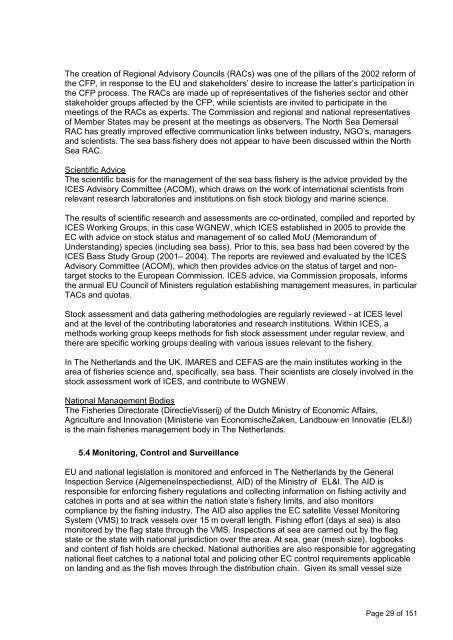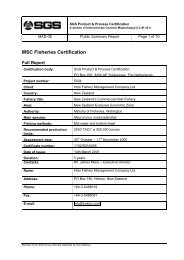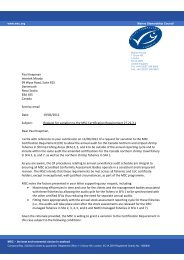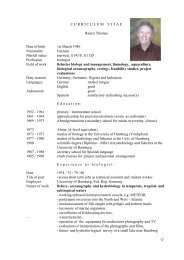SGS Product & Process Certification - Marine Stewardship Council
SGS Product & Process Certification - Marine Stewardship Council
SGS Product & Process Certification - Marine Stewardship Council
Create successful ePaper yourself
Turn your PDF publications into a flip-book with our unique Google optimized e-Paper software.
The creation of Regional Advisory <strong>Council</strong>s (RACs) was one of the pillars of the 2002 reform of<br />
the CFP, in response to the EU and stakeholders‘ desire to increase the latter‘s participation in<br />
the CFP process. The RACs are made up of representatives of the fisheries sector and other<br />
stakeholder groups affected by the CFP, while scientists are invited to participate in the<br />
meetings of the RACs as experts. The Commission and regional and national representatives<br />
of Member States may be present at the meetings as observers. The North Sea Demersal<br />
RAC has greatly improved effective communication links between industry, NGO‘s, managers<br />
and scientists. The sea bass fishery does not appear to have been discussed within the North<br />
Sea RAC.<br />
Scientific Advice<br />
The scientific basis for the management of the sea bass fishery is the advice provided by the<br />
ICES Advisory Committee (ACOM), which draws on the work of international scientists from<br />
relevant research laboratories and institutions on fish stock biology and marine science.<br />
The results of scientific research and assessments are co-ordinated, compiled and reported by<br />
ICES Working Groups, in this case WGNEW, which ICES established in 2005 to provide the<br />
EC with advice on stock status and management of so called MoU (Memorandum of<br />
Understanding) species (including sea bass). Prior to this, sea bass had been covered by the<br />
ICES Bass Study Group (2001– 2004). The reports are reviewed and evaluated by the ICES<br />
Advisory Committee (ACOM), which then provides advice on the status of target and nontarget<br />
stocks to the European Commission. ICES advice, via Commission proposals, informs<br />
the annual EU <strong>Council</strong> of Ministers regulation establishing management measures, in particular<br />
TACs and quotas.<br />
Stock assessment and data gathering methodologies are regularly reviewed - at ICES level<br />
and at the level of the contributing laboratories and research institutions. Within ICES, a<br />
methods working group keeps methods for fish stock assessment under regular review, and<br />
there are specific working groups dealing with various issues relevant to the fishery.<br />
In The Netherlands and the UK, IMARES and CEFAS are the main institutes working in the<br />
area of fisheries science and, specifically, sea bass. Their scientists are closely involved in the<br />
stock assessment work of ICES, and contribute to WGNEW.<br />
National Management Bodies<br />
The Fisheries Directorate (DirectieVisserij) of the Dutch Ministry of Economic Affairs,<br />
Agriculture and Innovation (Ministerie van EconomischeZaken, Landbouw en Innovatie (EL&I)<br />
is the main fisheries management body in The Netherlands.<br />
5.4 Monitoring, Control and Surveillance<br />
EU and national legislation is monitored and enforced in The Netherlands by the General<br />
Inspection Service (AlgemeneInspectiedienst, AID) of the Ministry of EL&I. The AID is<br />
responsible for enforcing fishery regulations and collecting information on fishing activity and<br />
catches in ports and at sea within the nation state‘s fishery limits, and also monitors<br />
compliance by the fishing industry. The AID also applies the EC satellite Vessel Monitoring<br />
System (VMS) to track vessels over 15 m overall length. Fishing effort (days at sea) is also<br />
monitored by the flag state through the VMS. Inspections at sea are carried out by the flag<br />
state or the state with national jurisdiction over the area. At sea, gear (mesh size), logbooks<br />
and content of fish holds are checked. National authorities are also responsible for aggregating<br />
national fleet catches to a national total and policing other EC control requirements applicable<br />
on landing and as the fish moves through the distribution chain. Given its small vessel size<br />
Page 29 of 151





